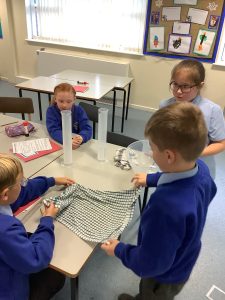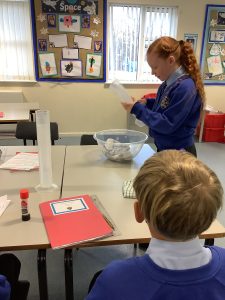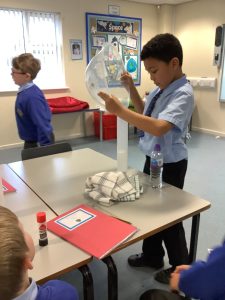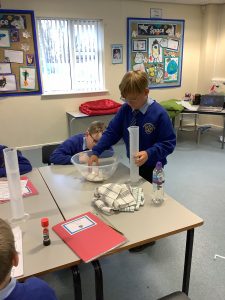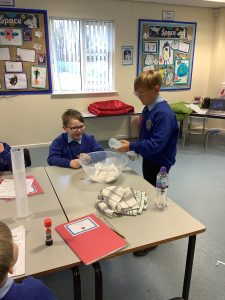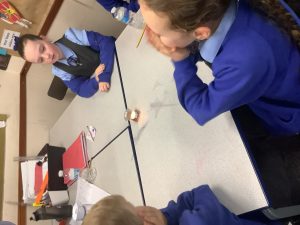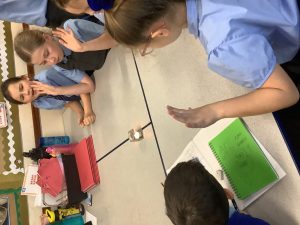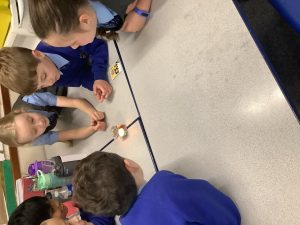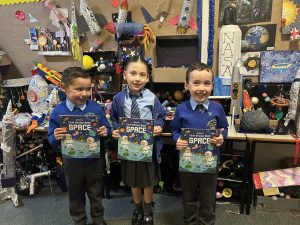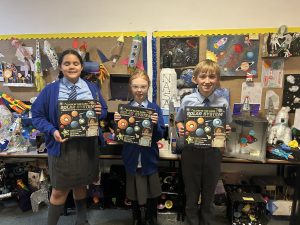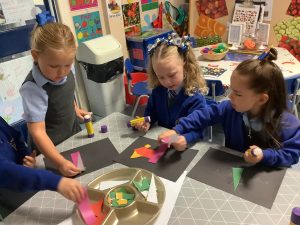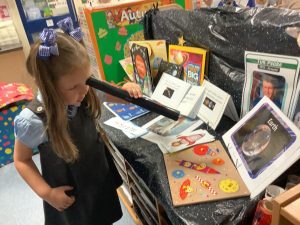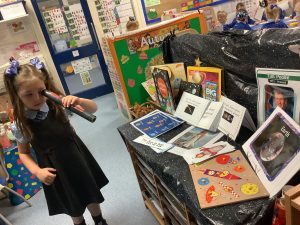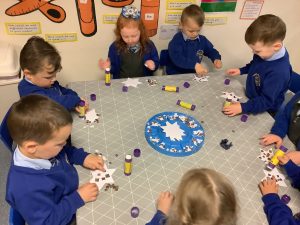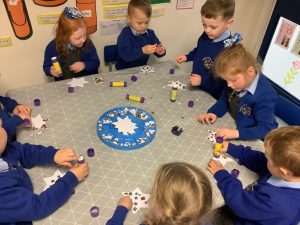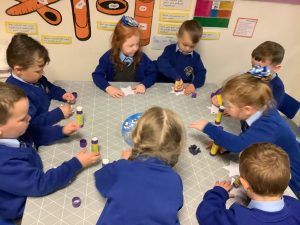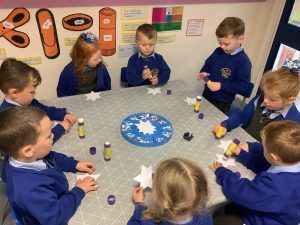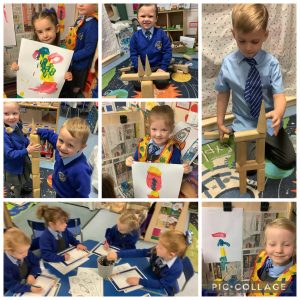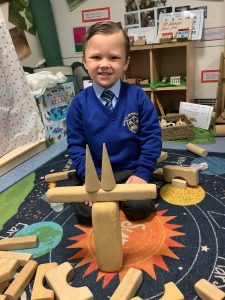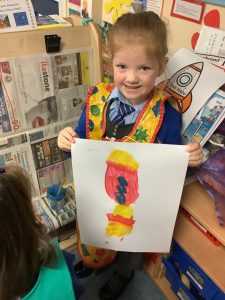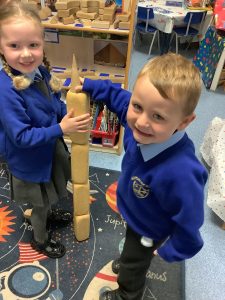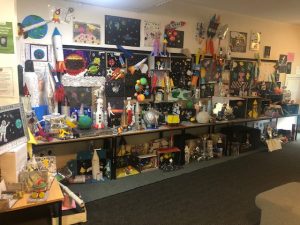Science
Science Lead – Miss Thompson
Mapping Progression across KS1 to KS2
Science LTP
“Science has changed our lives and is vital to the world’s future prosperity, and all pupil’s should be taught essential aspects of the knowledge, methods, uses and processes of science.” National Curriculum 2014
At Saints Peter and Paul we are scientists! We want our children to love science. We want them to have no limits to what their ambitions are and grow up wanting to be physicists, pharmacists, microbiologists, astronauts, forensic scientists, or wildlife biologists. We want our children to remember their science lessons in our school, to cherish these memories and embrace the scientific opportunities they are presented with!
Curriculum Intent
The science curriculum promotes curiosity and a love of learning. It is ambitious and empowers our children to become independent and resilient.
We want to equip them with not only the minimum statutory requirements of the science National Curriculum but to prepare them for the opportunities, responsibilities and experiences of later life.
We enrich their time in our school with memorable, unforgettable experiences and provide opportunities which piques their interests and passions. We firmly believe that it is not just about what happens in the classroom, it is about the added value we offer to really inspire our children. For example, trips, school visitors, competitions and Science week.
Our intention is to provide children with opportunities to retain knowledge and vocabulary. Our curriculum is carefully designed and planned in such a way that knowledge will be stored in children’s long-term memories, so that they can build on it and use it later in life. We ensure that all children gain a wealth of experiences beyond learning facts in the classroom. We want our curriculum to inspire children to want to learn more, to provoke children’s intellectual curiosity and to create experiences of awe and wonder. We believe in the power of knowledge to unlock doors in children’s lives. We believe that knowledge leads to understanding, and that understanding leads to wisdom. Acquiring powerful knowledge enables all children to become grounded people with strong character traits, providing a stepping-stone to a successful future.
Curriculum Implementation
The science curriculum has been carefully built and adapted within school and the learning opportunities and assessment milestones for each year group crafted to ensure progression and repetition in terms of embedding key learning, knowledge and skills.
For example, the way materials is taught in our school has been adapted so that it is revisited in each phase. In KS1, the children tackle ‘Everyday Materials’ where they look at the practical uses of everyday materials. In lower KS2, Year 4 explore ‘States of Matter’ and look at solids, liquids and gases, changes of state, evaporation, condensation and the water cycle. In upper KS2, Year 5 the children face ‘Materials – Properties and Changes’ where they examine changes to materials that create new materials that are usually not reversible.
Science subject specific characteristics, which we expect the children to demonstrate, have been developed and shared with all stakeholders. These characteristics underpin all work in science and form a focal point for display areas and provide a common subject specific vocabulary for staff and pupils. These characteristics are:
- The ability to think independently and raise questions about working scientifically and the knowledge and skills that it brings.
- Confidence and competence in the full range of practical skills, taking the initiative in, for example, planning and carrying out scientific investigations.
- Excellent scientific knowledge and understanding which is demonstrated in written and verbal explanations, solving challenging problems and reporting scientific findings.
- High levels of originality, imagination or innovation in the application of skills.
- The ability to undertake practical work in a variety of contexts.
- A passion for science and its application in past, present and future technologies.
We empower our staff to organise their own year group curriculums under the guidance of the subject leader. Teachers are best placed to make these judgements. Staff develop year group specific long-term curriculum maps which identify when the different subjects and topics will be taught across the academic year. The vast majority of subjects are taught discretely but staff make meaningful links across subjects where possible. They link prior knowledge to new learning to deepen children’s learning.
Our medium-term plans are used to set out the learning objectives for each lesson, identifying engaging activities and resources which will be used to achieve them.
In most instances staff will teach a weekly science lesson. These are delivered in year groups rather than mixed classes to ensure a broad and full coverage of the curriculum and ensuring there are no gaps in children’s learning. This was a notable change after the science audit. This helps to ensure sufficient time is allocated to science and that scientific subject matter can be revisited frequently. We believe that by crafting our curriculum this way, we improve the potential for our children to retain what they have been taught, to alter their long-term memory and thus improve the rates of progress they make.
In line with the National Curriculum 2014, the children in each year group cover the topics that link to the Learning Objectives for their year.
Early Years
The Early Years Framework is structured very differently to the National Curriculum as it is organised across 7 areas of learning rather than subject areas. ‘Development Matters’ (new Early Years Curriculum 2020) develops prerequisite skills for Science within the National Curriculum. These skills start in our 2 year old provision ‘Little Saints’ and are found within the areas Communication and Language, Personal, Social and Emotional Development and Understanding of the World.
The principal focus of science in the Early Years is to enable children with the skills to be able to comment and asks questions about aspects of their familiar world, recognising similarities and differences in relation to places, objects, materials and living things. To show care and concern for living things and the environment, make observations of and talk about some of the things they have observed such as plants, animals, natural and found objects.
To be able to talk about why things happen, how things work and explain why some things occur.
Understanding the world involves guiding children to make sense of their physical world and their community.
Years 1 and 2
The principal focus of science teaching is to enable pupils to experience
and observe phenomena, looking more closely at the natural and humanly constructed world around them. They should be encouraged to be curious and ask questions about what they notice. They should be helped to develop their understanding of scientific ideas by using different types of scientific enquiry to answer their own questions, including observing changes over a period of time, noticing patterns, grouping and classifying things, carrying out simple comparative tests, and finding things out using secondary sources of information. They should begin to use simple scientific language to talk about what they have found out and communicate their ideas to a range of audiences in a variety of ways. Most of the learning about science should be done through the use of first-hand practical experiences, but there should also be some use of appropriate secondary sources, such as books, photographs and videos.
Years 3 and 4
The principal focus of science teaching in lower key stage 2 is to enable pupils to broaden their scientific view of the world around them. They should do this through exploring, talking about, testing and developing ideas about everyday phenomena and the relationships between living things and familiar environments, and by beginning to develop their ideas about functions, relationships and interactions. They should ask their own questions about what they observe and make some decisions about which types of scientific enquiry are likely to be the best ways of answering them, including observing changes over time, noticing patterns, grouping and classifying things, carrying out simple comparative and fair tests and finding things out using secondary sources of information. They should draw simple conclusions and use some scientific language, first, to talk about and, later, to write about what they have found out.
Years 5 and 6
The principal focus of science teaching in upper key stage 2 is to enable pupils to develop a deeper understanding of a wide range of scientific ideas. They should do this through exploring and talking about their ideas; asking their own questions about scientific phenomena; and analysing functions, relationships and interactions more systematically. At upper key stage 2, they should encounter more abstract ideas and begin to recognise how these ideas help them to understand and predict how the world operates. They should also begin to recognise that scientific ideas change and develop over time. They should select the most appropriate ways to answer science questions using different types of scientific enquiry, including observing changes over different periods of time, noticing patterns, grouping and classifying things, carrying out comparative and fair tests and finding things out using a wide range of secondary sources of information. Pupils should draw conclusions based on their data and observations, use evidence to justify their ideas, and use their scientific knowledge and understanding to explain their findings.
Each individual class page will give more information into what Science aspects the children will be covering each half term on their long term plan
Curriculum Impact
We use both formative and summative assessment information in every science lesson. Staff use this information to inform their short-term planning and short-term interventions. This helps us provide the best possible support for all of our pupils, including the more able. The assessment milestones for each phase have been carefully mapped out and further broken down for each year group. This means that skills in science are progressive and build year on year.
Our staff use science formative assessment grids to systematically assess what the children know as the topic progresses and inform their future planning. These formative assessment grids then inform summative assessment judgements for each topic. To support this formative assessment the children complete an ‘End of Unit Quiz’ which identifies strengths and weaknesses for specific children and helps to inform future planning.
Assessment information is collected at the end of each topic. Teachers identify which children are working below, working towards, working at and greater depth against key objectives for each topic. This information in transferred to subject spreadsheets and from here we can analyse number of children achieving at each level. Plus looking at groups of children, e.g. boys v girls. This process provides an accurate and comprehensive understanding of the quality of education in science. A comprehensive monitoring cycle is developed at the beginning of each academic year. This identifies when monitoring is undertaken. Monitoring in science includes: book scrutiny, lesson observations and/or learning walks, pupil voice and staff voice.
All of this information is gathered and reviewed. It is used to inform further curriculum developments and provision is adapted accordingly.
The impact of our work is:
- Children can confidently recall key knowledge from current and previous areas of learning.
- Children can confidently apply knowledge to their learning.
- Children are confident using and applying key scientific vocabulary.
- Children are independent learners.
- Children enjoy learning and are excited and inspired to learn new things.
- Knowledge is retained in children’s long-term memories.
- Children have excellent attitudes to learning.
- Children demonstrate appreciation and wonder of the world they live in.
